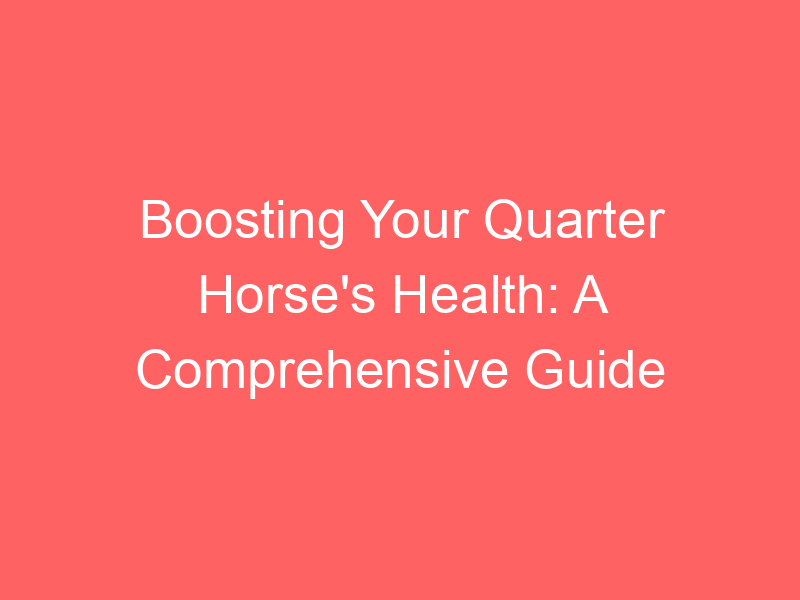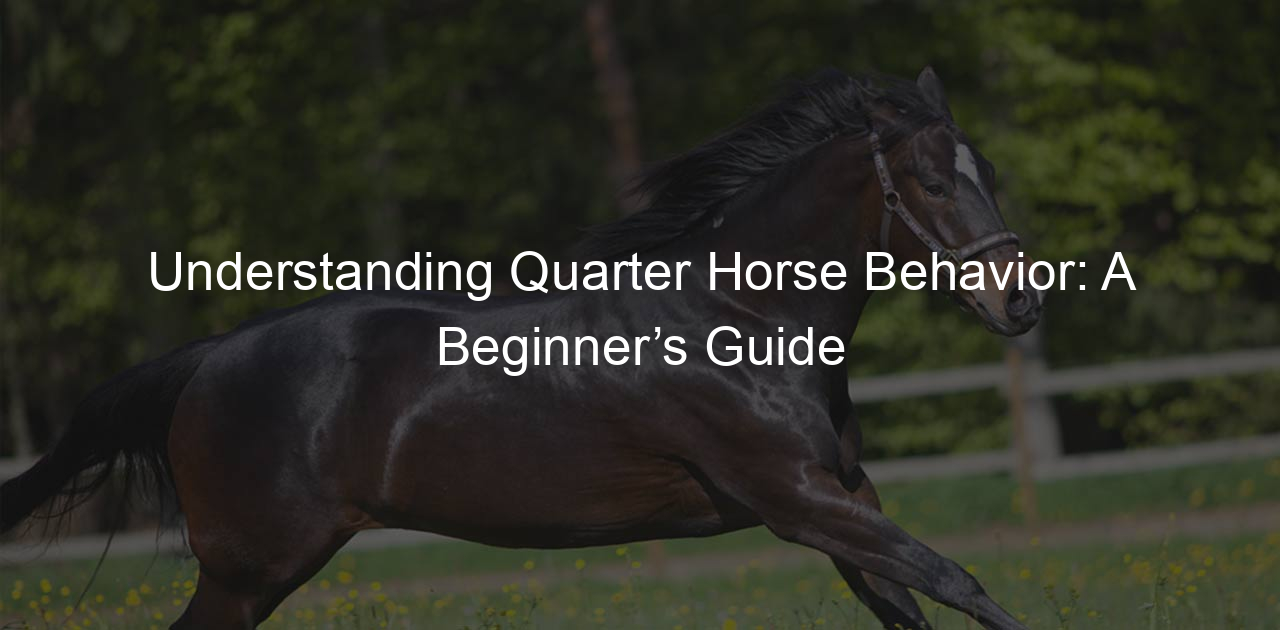
Introduction to Quarter Horse Care
When it comes to the care and well-being of Quarter Horses, there are several key aspects to consider. These include understanding the importance of horse well-being, enhancing horse health, and the role of nutrition in Quarter Horse wellness. Let’s delve into these topics further.
- Understanding the Importance of Horse Well-being
- Introduction to Enhancing Horse Health
- The Role of Horse Nutrition in Quarter Horse Wellness
The well-being of a Quarter Horse is paramount to its overall health and performance. A healthy horse is not only physically fit, but also mentally happy. It’s essential to provide your horse with a safe and comfortable environment, regular exercise, and proper veterinary care. According to a study by the American Veterinary Medical Association, regular health check-ups can prevent many common horse diseases.
Enhancing the health of your Quarter Horse involves a combination of proper nutrition, regular exercise, and routine veterinary care. This includes regular vaccinations, dental care, and parasite control. A healthy horse is more likely to perform well, whether in racing, riding, or work. In fact, a study by the University of Kentucky found that horses with regular health care and exercise routines were less likely to develop health issues.
Nutrition plays a vital role in the overall wellness of a Quarter Horse. A balanced diet is crucial for maintaining a healthy weight, promoting good digestion, and supporting a strong immune system. According to the National Research Council, a Quarter Horse’s diet should consist of high-quality forage, grains, and a balanced mineral supplement. Additionally, clean, fresh water should always be available.
In conclusion, the care and well-being of a Quarter Horse involve a comprehensive approach that includes understanding the importance of horse well-being, enhancing horse health, and recognizing the role of nutrition in horse wellness. By focusing on these key areas, you can ensure that your Quarter Horse thrives and performs at its best.
Essential Elements of Quarter Horse Training
Training a Quarter Horse involves a blend of physical and mental exercises. In this section, we will focus on the physical training aspect, which is crucial for the horse’s overall health and performance.
Physical Training
Physical training is a key component in Quarter Horse training. It not only enhances the horse’s strength and stamina but also contributes to its overall health and wellness. Let’s delve into the importance of regular exercise, best practices for physical training, and a case study on the impact of physical training on equine wellness.
- Importance of Regular Exercise
- Best Practices for Physical Training
- Case Study: Impact of Physical Training on Equine Wellness
Regular exercise is vital for Quarter Horses. It helps maintain their muscle tone, improves their cardiovascular health, and aids in digestion. It also keeps them mentally alert and reduces the risk of behavioral problems. Research shows that horses that exercise regularly are less likely to suffer from health issues like obesity and arthritis.
When it comes to physical training, it’s important to start slow and gradually increase the intensity. This allows the horse to build strength and endurance without getting injured. It’s also crucial to include a variety of exercises in the training regimen to keep the horse engaged and prevent boredom. For instance, you can alternate between long rides, short sprints, and agility training. Always remember to warm up before each training session and cool down afterwards to prevent muscle strain.
A study conducted by the University of Kentucky found that horses that underwent regular physical training showed improved heart health, better digestion, and lower stress levels compared to horses that did not exercise regularly. The study concluded that physical training plays a significant role in promoting equine wellness.
In conclusion, physical training is an essential part of Quarter Horse training. It not only improves the horse’s performance but also contributes to its overall health and wellness. Therefore, it’s important to incorporate regular exercise into your horse’s routine and follow best practices for physical training.
Mental Training
Just like humans, horses too need mental stimulation to keep their minds sharp and active. This section will delve into the importance of mental training for your Quarter Horse and how you can teach them commands and tricks.
- Teaching Your Horse Commands and Tricks
- Importance of Mental Stimulation for Horses
Training your horse to understand and respond to commands is a crucial part of their mental development. This not only helps in managing them better but also strengthens your bond with them. Start with simple commands like ‘stop’, ‘go’, ‘left’, and ‘right’. Once they master these, you can move on to teaching them tricks. Remember, patience and consistency are key in this process.
For example, to teach your horse to bow, start by holding a treat in your hand and slowly moving it down and towards their back leg. Your horse will naturally follow the treat, eventually learning to bow. This trick not only entertains but also helps stretch their muscles.
Mental stimulation is as important for horses as physical exercise. It keeps them engaged, reduces stress, and prevents behavioral issues. A mentally stimulated horse is more alert, responsive, and easier to train.
One way to mentally stimulate your horse is through ‘enrichment activities’. This could be as simple as introducing new toys in their stable or as complex as setting up obstacle courses for them. These activities challenge their thinking and keep them mentally active.
In conclusion, mental training plays a vital role in your horse’s overall well-being. It not only enhances their cognitive abilities but also improves their physical health and strengthens your bond with them. So, invest time in teaching your horse new commands and tricks, and ensure they get enough mental stimulation.
Nutrition for Enhancing Horse Health
One of the most crucial aspects of maintaining a healthy Quarter Horse is understanding and implementing proper nutrition. The right balance of nutrients can significantly enhance a horse’s health and performance.
Understanding Horse Nutrition
Just like humans, horses require a balanced diet to stay healthy and active. The key is to understand what nutrients are essential for a Quarter Horse and how they impact the horse’s overall health.
- Key nutrients needed for a Quarter Horse
- Proteins: Essential for growth and tissue repair.
- Fats: Provide energy and help in the absorption of certain vitamins.
- Carbohydrates: The primary source of energy.
- Vitamins and Minerals: Vital for various bodily functions and overall health.
- Impact of nutrition on Horse health improvement
- Boosts Immunity: A well-balanced diet strengthens the horse’s immune system, helping it fight off diseases.
- Enhances Performance: Proper nutrition provides the energy needed for optimal performance.
- Improves Digestive Health: A diet rich in fiber promotes a healthy digestive system.
- Promotes Healthy Skin and Coat: Essential fatty acids, vitamins, and minerals contribute to a shiny coat and healthy skin.
Quarter Horses require a variety of nutrients in their diet. These include:
Proper nutrition plays a significant role in enhancing a horse’s health. Here’s how:
In conclusion, understanding and implementing proper nutrition is key to enhancing a Quarter Horse’s health. It’s not just about feeding your horse, but about providing the right balance of nutrients to support their overall well-being.
Feeding Tips for Quarter Horses
Feeding your Quarter Horse correctly is a vital part of maintaining their health and performance. Here are some key tips to guide you.
- How to choose the right feed
- Feeding schedule and portion sizes
- Key takeaway: The role of nutrition in Quarter Horse lifestyle
Choosing the right feed for your Quarter Horse is a crucial step. The feed should be rich in essential nutrients such as proteins, vitamins, and minerals. A balanced diet can include hay, grains, and horse-specific feeds available in the market. Remember, the feed type may vary depending on the horse’s age, health, and activity level. For example, a working horse may need a higher calorie intake compared to a retired horse.
The feeding schedule and portion sizes play a significant role in your horse’s health. Quarter Horses typically do well with two to three meals a day. However, the portion size should be determined based on the horse’s weight and activity level. A common rule of thumb is to feed 1.5% to 2.5% of the horse’s body weight in feed per day. It’s always a good idea to consult with a veterinarian or a horse nutrition expert to determine the best feeding schedule and portion sizes for your horse.
Nutrition plays a pivotal role in the lifestyle of a Quarter Horse. A well-balanced diet can help maintain the horse’s energy levels, support their immune system, and contribute to a shiny, healthy coat. It can also aid in digestion and help prevent health issues such as colic or laminitis. Remember, a happy and healthy horse is a result of good nutrition and proper care.
Quarter Horse Lifestyle and Well-being
The lifestyle and well-being of a Quarter Horse greatly influence its health and performance. Here, we will discuss how to create a healthy environment for your Quarter Horse, focusing on the importance of a clean and safe stable and the need for social interaction.
Creating a Healthy Environment
Creating a healthy environment for your Quarter Horse is crucial for its well-being. This involves maintaining a clean and safe stable and providing opportunities for social interaction.
- Importance of a Clean and Safe Stable
- Providing Social Interaction for Your Horse
A clean and safe stable is the cornerstone of a healthy environment for your Quarter Horse. A well-kept stable reduces the risk of diseases and injuries. It is essential to regularly clean the stable, removing manure and wet bedding daily. Fresh water and food should always be available, and the stable should be well-ventilated and free from sharp objects that could harm the horse.
Quarter Horses, like all equines, are social animals. They thrive in the company of other horses and even humans. Social interaction helps them to stay mentally healthy and reduces stress. It can be as simple as allowing your horse to graze in a pasture with other horses or scheduling regular playtimes. Remember, a happy horse is a healthy horse.
In conclusion, creating a healthy environment for your Quarter Horse involves maintaining a clean and safe stable and providing ample opportunities for social interaction. By following these guidelines, you can ensure your horse’s well-being and enhance its performance.
Regular Health Check-ups
Just like humans, horses too need regular health check-ups to ensure they are in the best possible condition. These check-ups are crucial for early detection of potential health issues and for maintaining the overall well-being of your Quarter Horse.
- Importance of Regular Vet Visits
- Common Health Issues in Quarter Horses
Regular vet visits are essential for your Quarter Horse’s health. A vet can monitor your horse’s health, administer necessary vaccinations, and provide expert advice on nutrition and care. According to a study, horses that receive regular vet check-ups are less likely to develop serious health issues.
Quarter Horses, like any other breed, are susceptible to certain health issues. Some of the common health problems include Laminitis (a painful condition affecting the horse’s feet), Colic (a severe abdominal discomfort), and Equine Infectious Anemia (a potentially fatal viral disease). Early detection through regular vet visits can help manage these conditions effectively.
| Common Health Issues | Symptoms | Prevention |
|---|---|---|
| Laminitis | Limping, difficulty moving, heat in the feet | Proper diet, regular exercise, and hoof care |
| Colic | Pacing, rolling, lack of appetite | Regular vet check-ups, proper diet, and hydration |
| Equine Infectious Anemia | Fever, weakness, weight loss | Regular testing and isolation of infected horses |
In conclusion, regular health check-ups and vet visits are vital in maintaining your Quarter Horse’s health and well-being. They help detect and manage common health issues effectively, ensuring your horse leads a healthy and happy life.
Conclusion: Horse Care Tips for a Healthy Quarter Horse
In this article, we’ve explored the essential elements of Quarter Horse care. Let’s summarize the key points to remember for ensuring the health and wellness of your Quarter Horse.
- Recap of the importance of training, nutrition, and lifestyle
- Final thoughts on Quarter Horse care and wellness
Training is crucial for a Quarter Horse’s physical and mental health. A well-trained horse is not only a joy to ride but also less likely to develop behavioral problems. Nutrition plays a significant role in maintaining a horse’s health. A balanced diet, rich in essential nutrients, is vital for a Quarter Horse’s energy, growth, and overall well-being. Lastly, a horse’s lifestyle, including its living conditions and daily routine, greatly impacts its health. Providing a clean, comfortable environment and a consistent routine can help prevent health issues and promote a horse’s well-being.
Caring for a Quarter Horse is a rewarding responsibility. It requires a commitment to understanding their needs and providing the best possible care. Remember, a healthy horse is a happy horse. By focusing on training, nutrition, and lifestyle, you can ensure your Quarter Horse leads a healthy, fulfilling life.
As the saying goes, “The horse is a mirror to your soul… and they always reflect you truthfully.” So, let’s strive to reflect the best of ourselves in our care for these magnificent creatures.









